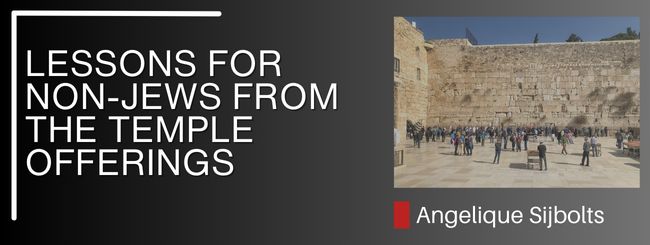בס”ד
PARSHAT TZAV 5784
In a parasha that has the offerings in the Temple as its main theme, non-Jews can find important lessons. Offer, known as “korban” in Hebrew, means “to draw near”. The Temple served as a place where people could draw closer to G-d through their offerings, where heaven and earth met. It was not only a location for offerings, but also a place for prayer and the study of Torah.
Non-Jews were allowed to offer the “Olah” in the Temple, a voluntary offering that symbolized the offeror’s complete dedication to G-d, without holding anything back. The olah offering symbolized the offeror’s willingness to dedicate themselves entirely to God, to give their animalistic soul wholly to G-d, without holding anything back. It had no meal component like other offerings, but was entirely burned as a sweet aroma to the Lord. While offering sacrifices without the Temple is not possible today, non-Jews can still build an altar and offer a kosher animal or bird as a burnt offering to G-d, as described in the Sheva Mitzvot HaShem. However, it is strongly discouraged to do so in our time for two reasons: Firstly, offering a sacrifice requires a deep commitment to G-d, similar to that of Jewish priests in the Temple, which is difficult to achieve today. Secondly, such a service to G-d must be accompanied by a reliable and knowledgeable Orthodox rabbi, which is currently difficult to realize.
So, for both Jews and non-Jews today, for various reasons, it is not possible to bring a burnt offering (or any other type of offering for Jews) to G-d. But we can still say prayers to G-d. Moreover, in Hosea 14:3 we read:
Here it specifically states that prayers have taken the place of offerings. As explained by the Nefesh Hachaim in 2:9:
And specifically when he stands before Him (blessed be He) to pray at the time designated for it [fem.], that [fem.] is the essence of nourishment for the worlds and the soul-Neffesh of the man himself [*]. And as is written in Zohar Bereshit (24a): “His nourishment [is] prayer which is considered as a sacrificial offering.
The Tabernacle and the Temple were strongly connected to the aspect of speech. It was at that place where G-d spoke with Moses face to face, where the priests sang hymns to G-d with their voices. Today, it is the place to which we send our prayers to ascend to G-d. It is our prayers with which we want to connect with G-d, with which we bring our animalistic needs to G-d, knowing that we must direct our souls towards connection with Him and that our needs must be in accordance with His will. We must focus on the seven Noahide laws, on the needs of our fellow human beings, and show them grace and love. We must direct our soul, thoughts, and actions towards creating a better world, a world in which the connection between heaven and earth will be so strong that, although at the beginning of the Messianic era sacrifices will be brought.
In the time of the First and Second Temple, non-Jews brought their offerings to the Temple, where they were brought in by the Priests. This happened especially during the Feast of Tabernacles. This will also happen in the time of the Messiah, as foretold in Zechariah. (Zechariah-14:16-17)
This will be the Olah offering, because in that time no other offerings, such as sin offerings, will be necessary. In the time of the Messiah, people will no longer sin, because there will be no Yetzer Hara (there is also the opinion that it will still exist but will no longer be able to influence humans because it is logical that you burn your hand if you put it in the fire), as Sukkah 52a teaches. This is because the knowledge of G-d will be spread throughout the earth, as Isaiah 11:9 indicates:
Learning Points
- The Temple served as a place of spiritual connection where people could draw closer to G-d through their offerings.
- The Olah-offer symbolized complete dedication to G-d, representing the willingness to surrender one’s entire being.
- While offerings are no longer possible without the Temple, prayers serve as a substitute, as Hosea 14:3 suggests.
- The Temple was a hub for communication with G-d, where prayers and praise were offered.
- Today, prayers are the means through which we connect with G-d and express our needs and desires in alignment with His will.
- The future Messianic era may see the return of offerings, symbolizing a world free from sin and filled with knowledge of G-d.
By Angelique Sijbolts
Sources
The Divine Code by Rabbi Moshe Weiner chapter 7 Offerings
Text: Sefaria.org
© Copyright, all rights reserved. If you enjoyed this article, we encourage you to distribute it further.
Our blogs may contain texts/ quotes/references/links of
Mechon-Mamre.org, Aish.com, Sefaria.org, Chabad.org AskNoah.org
that contain copyrights and which we may use with there permission.
